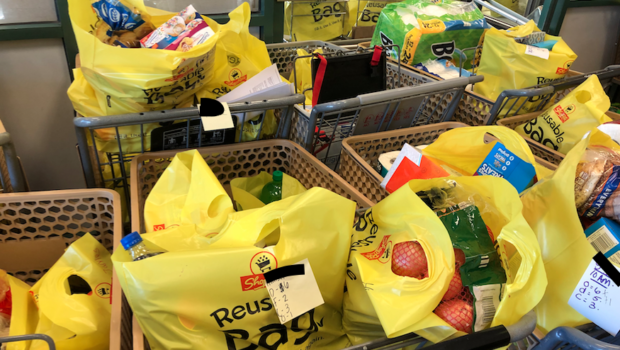
PLASTUCK: Why Are Some Hoboken Stores Continuing to Use Plastic Bags Despite the Ban?
With a more than a bit of fanfare, the City of Hoboken proudly implemented its single-use plastic bag ban last month, aimed at reducing the dependency of retailers and consumers on throw-away plastic.
“Single-use plastic bags are incredibly wasteful and destructive to our community and the environment,” said Hoboken Mayor Ravi Bhalla, in his June 6, 2018 statement announcing the ban. “The US wastes hundreds of billions of these bags every year. This ban is a reasonable way we as Hobokenites can do our part to cut down on litter and pollution.”
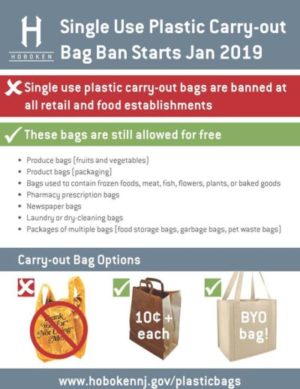
The goal was to push reusable tote bags. Barring that, retailers would make paper available to consumers at a cost of 10-25 cents, to offset the higher cost of the paper bags for merchants (relative to single-use plastic).
Nevertheless, certain retailers are still handing out plastic bags a month later—and are apparently doing so legally.
“Hoboken’s single-use plastic bag ban, drafted by the Hoboken Green Team and Councilman Jim Doyle, was modeled based on successful legislation in other states and municipalities and has dramatically reduced the use of single-use plastic bags,” said Hoboken Spokesperson Vijay Chaudhuri.
According to the City, Hoboken’s ban is nearly identical to California’s ban—which actually allows for certain, thicker types of plastic to be used as “Reusable Bags.”
“The 2.25 mil plastic bags were included in the ordinance as permitted bags because (a) they are, by design, able to hold up to 25 lbs, (b) they are, by design, strong enough to withstand being reused 125 times, and (c) some limited percentage of vendors sell products that are very heavy or bulky and may not be a good fit for paper bags (e.g., five bottles of wine),” said Doyle. “Because these bags are more costly than their paper option counterparts, we hoped that only those few businesses that genuinely needed them would choose that route.”
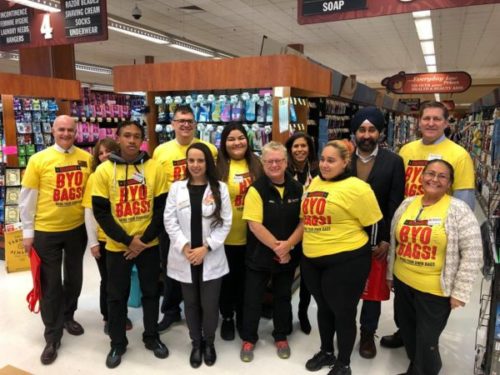
via City of Hoboken
ShopRite, which had been featured prominently in the City’s awareness campaign on the single-use ban, is one of those businesses.
“The new law bans single-use plastic bags. ShopRite believes the best bag is a reusable bag and we encourage customers to bring their reusable bags to the store,” says Karen O’Shea, a Corporate Communications representative for Wakefern—ShopRite’s parent company.
“The new 10-cent reusable, recyclable and cleanable bag is an inexpensive option at checkout for customers who forget to bring their own reusable totes to the store. These durable bags can hold more groceries than single-use bags and can be used over and over again. They can also be wiped down with disinfectant cloths. This information is printed on the bag to inform customers. Paper bags are also available for 10 cents.”

While BYOBags are still the preferred method and paper is in fact available, the presence of plastic at the checkout counter has many wondering the point of it all.
Hoboken sits at the mouth of the Hudson River, which flows into New York Harbor and directly into the Atlantic Ocean. Plastic bags are very dangerous for sea life—especially dolphins, seals or turtles—as they are the most likely to mistake the plastic bag for food. Provided they don’t asphyxiate from initially ingesting the bag, they’re facing slow and painful death from toxicity or intestinal blockage.
Then there’s the overall effect of floating trash. Polyethylene is not readily biodegradable, which means this stuff will be floating around for the foreseeable future. The less plastic we use, the less likely it is to find its way into trees or rivers.

“The legitimate concerns are that some of the stores that have chosen to go the 2.25 mil bag route have chosen bags that visually resemble their flimsy predecessors, so uninformed shoppers my just unwittingly toss them out,” says Doyle. “We are asking that such plastic bags have text on them making it clear that it is stronger and intended to be reused multiple times. The retailers are cooperating.”
He adds, “We also are concerned that the stores with the 2.25 mil bags make it clear that paper bags are also an option at the register, so shoppers have that clear choice at the point of sale.”

Says O’Shea, “The other reusable bags that we have long stocked and sold in our stores include the popular canvas, jute and polypropylene totes that customers can purchase and keep handy for future shopping trips. Our goal is to encourage all customers to bring their reusable bags to the store when they shop.”
Acme, another chain grocer in Hoboken, has also chosen to offer the “reusable” plastic bag to their customers. Kings, with two stores in Hoboken, has reportedly cut out its plastic altogether. Trader Joe’s has never used plastic, although consumers have complained that the store is now tacking on the surcharge for its paper bags, which were formerly complimentary.
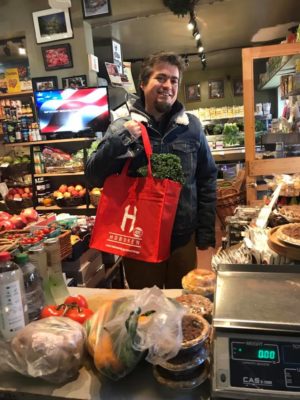
Ultimately, the consumer has the opportunity to make this a lot easier, given the volume of options available. Retailers citywide are offering fabric totes and other options. Furthermore, the City has been assertive in its push to hand out bags to residents.
“The ShopRite of Hoboken has also given free reusable bags to all the public schools in the city and Stevens Institute of Technology in Hoboken,” says O’Shea. “The store also continues to offer Buy One, Get One Free promotions on reusable bags. ShopRite promotes bag reuse by making affordable reusable bags available for purchase at all our stores and providing recycling bins where customers can return used plastic grocery shopping bags.”
It’s worth noting that upon our visit to ShopRite to research this article, there were a grand total of zero plastic bags floating around the parking lot. The issue of the store’s steady output of easily airborne single-use plastic was a driving force behind support for the ban. Meanwhile consciousness has been elevated, and more and more people are bringing their own reusable tote bags with them to do their shopping.
Will that be enough?
“Ultimately, the City’s Green Team intends to collect data from these stores on the 2.25 mil bag usage rates (and paper bag rates) as compared to the former single use, flimsy bag usage rates. Such an analysis is complicated by the reality of some percentage of shoppers bringing their our bags, unrelated to the 2.25 mil bags, but the data can be massaged to yield usable results,” says Doyle.
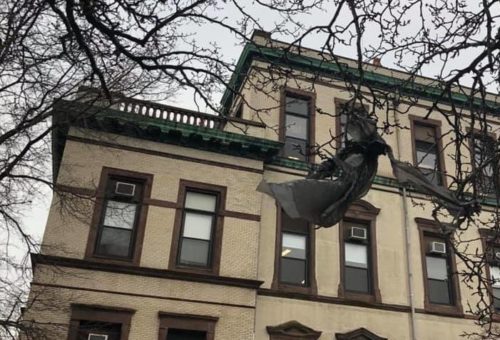
“The bottom line is if it is established that the volume of usage is not reflective of the 2.25 mil bags being reused consistently, that could indicate that people are merely treating them as they did the former single use bags. If this proves to be the case, the availability of the 2.25 mil bags would in fact be defeating the intent of bag ban, and l would certainly look to changing the ordinance to restrict their availability outright.”
Meanwhile, here’s a timely remind of what this is all about—courtesy of Wild Jersey City.
Enjoy…
***

 Previous Article
Previous Article Next Article
Next Article BOUNCED: Hoboken Nightclub Under Investigation for Lewd Conduct Gets Evicted
BOUNCED: Hoboken Nightclub Under Investigation for Lewd Conduct Gets Evicted  SNOW IDEA: NY/NJ Metro Forecast Shifts, With Potential Snowfall Between 4-8 Inches
SNOW IDEA: NY/NJ Metro Forecast Shifts, With Potential Snowfall Between 4-8 Inches  LIVE MUSIC: The Defending Champions, Big Wake and Garden State Line Tonight at Maxwell’s
LIVE MUSIC: The Defending Champions, Big Wake and Garden State Line Tonight at Maxwell’s 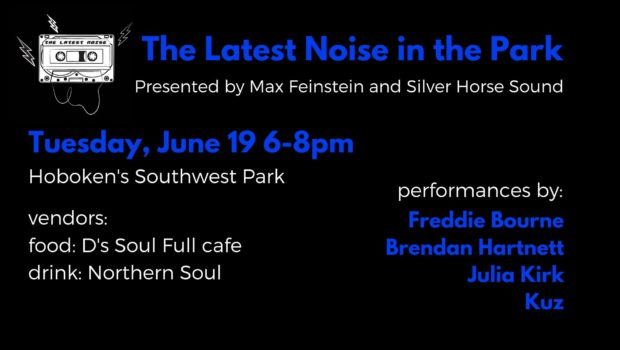 ROCK ON THE ROCKS: The Latest Noise Presents Freddie Bourne, Brendan Hartnett, Julia Kirk & Kuz at Hoboken’s SW Park – TUESDAY, JUNE 19th from 6-8
ROCK ON THE ROCKS: The Latest Noise Presents Freddie Bourne, Brendan Hartnett, Julia Kirk & Kuz at Hoboken’s SW Park – TUESDAY, JUNE 19th from 6-8  Hoboken City Council Narrowly Approves 1.7% Tax Increase as Sparks Inevitably Fly
Hoboken City Council Narrowly Approves 1.7% Tax Increase as Sparks Inevitably Fly  FRIDAYS ARE FOR FRANK: “Easter Parade” (feat. Eileen Wilson)
FRIDAYS ARE FOR FRANK: “Easter Parade” (feat. Eileen Wilson)  COLD PORRIDGE: Murder Mystery Fans to Lap Up New Play at the Hudson Guild Theatre
COLD PORRIDGE: Murder Mystery Fans to Lap Up New Play at the Hudson Guild Theatre 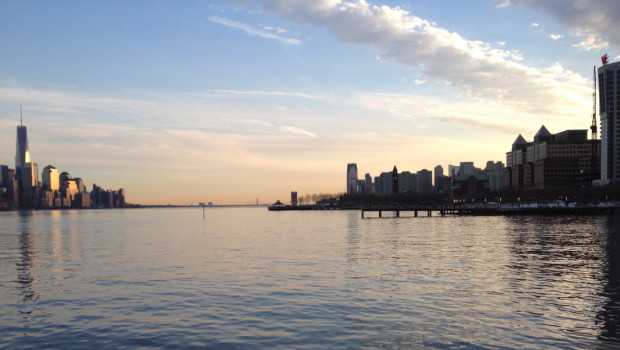 Hoboken Ranks Among the Highest-Earning Cities in America
Hoboken Ranks Among the Highest-Earning Cities in America